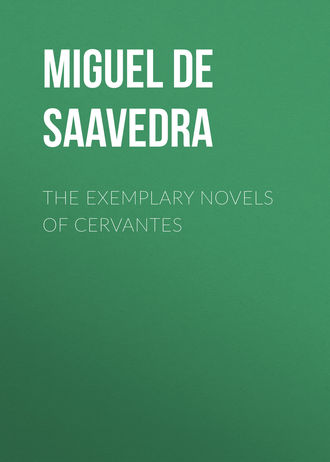 полная версия
полная версияThe Exemplary Novels of Cervantes
All this did but lay fuel on the flame of Monipodio's anger, and the entire assembly partook of his emotions; the honourable members perceiving that their statutes were violated, and their wise ordinances infringed. Seeing, therefore, that the confusion and alarm had now got to such a height, Rinconete began to think it time to allay it, and to calm the anger of his superior, who was bursting with rage. He took counsel for a moment with Cortadillo, and receiving his assent, drew forth the purse of the Sacristan, saying: —
"Let all questions cease, gentlemen: here is the purse, from which nothing is missing that the Alguazil has described, since my comrade Cortadillo prigged it this very day, with a pocket-handkerchief into the bargain, which he borrowed from the same owner." Thereupon Cortadillo produced the handkerchief before the assembled company.
Seeing this, Monipodio exclaimed "Cortadillo the Good! for by that title and surname shall you henceforward be distinguished. Keep the handkerchief, and I take it upon myself to pay you duly for this service; as to the purse, the Alguazil must carry it away just as it is, for it belongs to a Sacristan who happens to be his relation, and we must make good in his case the proverb, which says, 'To him who gives thee the entire bird, thou canst well afford a drumstick of the same.' This good Alguazil can save us from more mischief in one day than we can do him good in a hundred."
All the brotherhood with one voice approved the spirit and gentlemanly proceeding of the two new comers, as well as the judgment and decision of their superior, who went out to restore the purse to the Alguazil. As to Cortadillo, he was confirmed in his title of the Good, much as if the matter had concerned a Don Alonzo Perez de Guzman, surnamed the Good, who from the walls of Tarifa threw down to his enemy the dagger that was to destroy the life of his only son.24
When Monipodio returned to the assembly he was accompanied by two girls, with rouged faces, lips reddened with carmine, and necks plastered with white. They wore short camlet cloaks, and exhibited airs of the utmost freedom and boldness. At the first glance Rinconete and Cortadillo could see what was the profession of these women. They had no sooner entered, than they hurried with open arms, the one to Chiquiznaque, the other to Maniferro; these were the two bravos, one of whom bore the latter name because he had an iron hand, in place of one of his own, which had been cut off by the hand of justice. These two men embraced the girls with great glee, and inquired if they had brought the wherewithal to moisten their throats. "How could we think of neglecting that, old blade!" replied one of the girls, who was called Gananciosa.25 "Silvatillo, your scout, will be here before long with the clothes-basket, crammed with whatever good luck has sent us."
And true it was; for an instant afterwards, a boy entered with a clothes-basket covered with a sheet.
The whole company renewed their rejoicings on the arrival of Silvatillo, and Monipodio instantly ordered that one of the mats should be brought from the neighbouring chamber, and laid out in the centre of the court. Furthermore he commanded that all the brotherhood should take places around it, in order that while they were taking the wrinkles out of their stomachs, they might talk about business.
To this proposal the old woman, who had been kneeling before the image, replied, "Monipodio, my son, I am not in the humour to keep festival this morning, for during the last two days I have had a giddiness and pain in my head, that go near to make me mad; I must, besides, be at our Lady of the Waters before mid-day strikes, having to accomplish my devotions and offer my candles there, as well as at the crucifix of St. Augustin; for I would not fail to do either, even though it were to snow all day and blow a hurricane. What I came here for is to tell you, that last night the Renegade and Centipede brought to my house a basket somewhat larger than that now before us; it was as full as it could hold of fine linen, and, on my life and soul, it was still wet and covered with soap, just as they had taken it from under the nose of the washerwoman, so that the poor fellows were perspiring and breathless beneath its weight. It would have melted your heart to see them as they came in, with the water streaming from their faces, and they as red as a couple of cherubs. They told me, besides, that they were in pursuit of a cattle-dealer, who had just had some sheep weighed at the slaughter-house, and they were then hastening off to see if they could not contrive to grab a great cat26 which the dealer carried with him. They could not, therefore, spare time to count the linen, or take it out of the basket but they relied on the rectitude of my conscience; and so may God grant my honest desires, and preserve us all from the power of justice, as these fingers have refrained from touching the basket, which is as full as the day it was born."
"We cannot doubt it, good mother," replied Monipodio. "Let the basket remain where it is; I will come at nightfall to fetch it away, and will then ascertain the quantity and quality of its contents, giving to every one the portion, due to him, faithfully and truly, as it is my habit to do."
"Let it be as you shall command," rejoined the old woman; "and now, as it is getting late, give me something to drink, if you have it there – something that will comfort this miserable stomach, which is almost famishing for want."
"That you shall have, and enough of it, mother," exclaimed Escalanta, the companion of Gananciosa; and, uncovering the basket, she displayed a great leather bottle, containing at least two arrobas27 of wine, with a cup made of cork, in which you might comfortably carry off an azumbre,28 or honest half-gallon of the same. This Escalanta now filled, and placed it in the hands of the devout old woman, who took it in both her own, and, having blown away a little froth from the surface, she said, —
"You have poured out a large quantity, Escalanta, my daughter; but God will give me strength." Whereupon, without once taking breath, and at one draught, she poured the whole from the cup down her throat. "It is real Guadalcanal,"29 said the old woman, when she had taken breath; "and yet it has just a tiny smack of the gypsum. God comfort you, my daughter, as you have comforted me; I am only afraid that the wine may do me some mischief, seeing that I have not yet broken my fast."
"No, mother; it will do nothing of the kind," returned Monipodio, "for it is three years old at the least."
"May the Virgin grant that I find it so," replied the old woman. Then turning to the girls, "See, children," she said "whether you have not a few maravedis to buy the candles for my offerings of devotion. I came away in so much haste, to bring the news of the basket of linen, that I forgot my purse, and left it at home."
"Yes, Dame Pipota," – such was the name of the old woman, – "I have some," replied Gananciosa; "here are two cuartos for you, and with one of them I beg you to buy a candle for me, which you will offer in my name to the Señor St. Michael, or if you can get two with the money, you may place the other at the altar of the Señor St. Blas, for those two are my patron-saints. I also wish to give one to the Señora Santa Lucia, for whom I have a great devotion, on account of the eyes;30 but I have no more change to-day, so it must be put off till another time, when I will square accounts with all."
"And you will do well, daughter," replied the old woman. "Don't be niggard, mind. It is a good thing to carry one's own candles before one dies, and not to wait until they are offered by the heirs and executors of our testament."
"You speak excellently, Mother Pipota," said Escalanta; and, putting her hand into her pocket, she drew forth a cuarto, which she gave the old woman, requesting her to buy two candles for her likewise, and offer them to such saints as she considered the most useful and the most likely to be grateful. With this old Pipota departed, saying,
"Enjoy yourselves, my dears, now while you have time, for old age will come and you will then weep for the moments you may have lost in your youth, as I do now. Commend me to God in your prayers, and I will remember you, as well as myself, in mine, that he may keep us all, and preserve us in this dangerous trade of ours from all the terrors of justice." These words concluded, the old woman went her way.
Dame Pipota having disappeared, all seated themselves round the mat, which Gananciosa covered with the sheet in place of a table-cloth. The first thing she drew from the basket was an immense bunch of radishes; this was followed by a couple of dozens or more of oranges and lemons; then came a great earthen pan filled with slices of fried ling, half a Dutch cheese, a bottle of excellent olives, a plate of shrimps, and a large dish of craw-fish, with their appropriate sauce of capers, drowned in pepper-vinegar: three loaves of the whitest bread from Gandul completed the collation. The number of guests at this breakfast was fourteen, and not one of them failed to produce his yellow-handled knife, Rinconete alone excepted, who drew his dudgeon dagger instead. The two old men in serge gowns, and the lad who had been the guide of the two friends, were charged with the office of cupbearers, pouring the wine from the bottle into the cork cup.
But scarcely had the guests taken their places, before they were all startled, and sprang up in haste at the, sound of repeated knocks at the door. Bidding them remain quiet, Monipodio went into one of the lower rooms, unhooked a buckler, took his sword in his hand, and, going to the door, inquired, in a rough and threatening voice, "Who is there?"
"All right Señor! it is I, Tagarote,31 on sentry this morning," replied a voice from without. "I come to tell you that Juliana de Cariharta32 is coming, with her hair all about her face, and crying her eyes out, as though some great misfortune had happened to her."
He had scarcely spoken when the girl he had named came sobbing to the door, which Monipodio opened for her, commanding Tagarote to return to his post; and ordering him, moreover, to make less noise and uproar when he should next bring notice of what was going forward, – a command to which the boy promised attention.
Cariharta, a girl of the same class and profession with those already in presence, had meanwhile entered the court, her hair streaming in the wind, her eyes swollen with tears, and her face covered with contusions and bruises. She had no sooner got into the Patio, than she fell to the ground in a fainting fit. Gananciosa and Escalanta33 sprang to her assistance, unfastened her dress, and found her breast and shoulders blackened and covered with marks of violence. After they had thrown water on her face, she soon came to herself, crying out as she did so, "The justice of God and the king on that shameless thief, that cowardly cut-purse, and dirty scoundrel, whom I have saved from the gibbet more times than he has hairs in his beard. Alas! unhappy creature that I am! see for what I have squandered my youth, and spent the flower of my days! For an unnatural, worthless, and incorrigible villain!"
"Recover yourself, and be calm, Cariharta," said Monipodio; "I am here to render justice to you and to all. Tell me your cause of complaint, and you shall be longer in relating the story than I will be in taking vengeance. Let me know if anything has happened between you and your respeto;34 and if you desire to be well and duly avenged. You have but to open your mouth."
"Protector!" exclaimed the girl. "What kind of a protector is he? It were better for me to be protected in hell than to remain any longer with that lion among sheep, and sheep among men! Will I ever eat again with him at the same table, or live under the same roof? Rather would I give this flesh of mine, which he has put into the state you shall see, to be devoured alive by raging beasts." So saying, she pulled up her petticoats to her knees, and even a little higher, and showed the wheals with which she was covered. "That's the way," she cried, "that I have been treated by that ungrateful Repolido,35 who owes more to me than to the mother that bore him.
"And why do you suppose he has done this? Do you think I have given him any cause? – no, truly. His only reason for serving me so was, that being at play and losing his money, he sent Cabrillas, his scout, to me for thirty reals, and I could only send him twenty-four. May the pains and troubles with which I earned them be counted to me by heaven in remission of my sins! But in return for this civility and kindness, fancying that I had kept back part of what he chose to think I had got, the blackguard lured me out to the fields this morning, beyond the king's garden, and there, having stripped me among the olive trees, he took off his belt, not even removing the iron buckle – oh that I may see him clapped in irons and chains! – and with that he gave me such an unmerciful flogging, that he left me for dead; and that's a true story, as the marks you see bear witness."
Here Cariharta once more set up her pipes and craved for justice, which was again promised to her by Monipodio and all the bravos present.
The Gananciosa then tried her hand at consoling the victim; saying to her, among other things – "I would freely give my best gown that my fancy man had done as much by me; for I would have you know, sister Cariharta, if you don't know it yet, that he who loves best thrashes best; and when these scoundrels whack us and kick us, it is then they most devoutly adore us. Tell me now, on our life, after having beaten and abused you, did not Repolido make much of you, and give you more than one caress?"
"More than one!" replied the weeping girl; "he gave me more than a hundred thousand, and would have given a finger off his hand if I would only have gone with him to his posada; nay, I even think that the tears were almost starting from his eyes after he had leathered me."
"Not a doubt of it," replied Gananciosa; "and he would weep now to see the state he has put you into: for men like him have scarcely committed the fault before repentance begins. You will see, sister, if he does not come here to look for you before we leave the place; and see if he does not beg you to forgive what has passed, and behave to you as meek and as humble as a lamb."
"By my faith," observed Monipodio, "the cowardly ruffian shall not enter these doors until he has made full reparation for the offence he has committed. How dare he lay a hand on poor Cariharta, who for cleanliness and industry is a match for Gananciosa herself, and that is saying everything."
"Alas! Señor Monipodio," replied Juliana, "please do not speak too severely of the miserable fellow; for, hard as he is, I cannot but love him as I do the very folds of my heart; and the words spoken in his behalf by my friend Gananciosa have restored the soul to my body. Of a truth, if I consulted only my own wishes, I should go this moment and look for him."
"No, no," replied Gananciosa, "you shall not do so by my counsel; for to do that would make him proud; he would think too much of himself, and would make experiments upon you as on a dead body. Keep quiet, sister, and in a short time you will see him here repentant, as I have said; and if not, we will write verses on him that shall make him roar with rage."
"Let us write by all means," returned Juliana, "for I have a thousand things to say to him."
"And I will be your secretary, if need be," rejoined Monipodio, "for although I am no poet, yet a man has but to tuck up the sleeves of his shirt, set well to work, and he may turn off a couple of thousand verses in the snapping of a pair of scissors. Besides, if the rhymes should not come so readily as one might wish, I have a friend close by, a barber, who is a great poet, and will trim up the ends of the verses at an hour's notice. At present, however, let us go finish our repast; all the rest can be done afterwards."
Juliana was not unwilling to obey her superior, so they all fell to again at the O-be-joyful with so much goodwill that they soon saw the bottom of the basket and the dregs of the great leather bottle. The old ones drank sine fine, the younger men to their hearts' content, and the ladies till they could drink no more. When all was consumed, the two old men begged permission to take their leave, which Monipodio allowed them to do, but charged them to return punctually, for the purpose of reporting all they should see or hear that could be useful to the brotherhood; they assured him they would by no means fail in their duty, and then departed.
After these gentlemen had left the company, Rinconete, who was of a very inquiring disposition, begged leave to ask Monipodio in what way two persons so old, grave, and formal as those he had just seen, could be of service to their community. Monipodio replied, that such were called "Hornets" in their jargon, and that their office was to poke about all parts of the city, spying out such places as might be eligible for attempts to be afterwards made in the night-time. "They watch people who receive money from the bank or treasury," said he, "observe where they go with it, and, if possible, the very place in which it is deposited. When this is done, they make themselves acquainted with the thickness of the walls, marking out the spot where we may most conveniently make our guzpataros, which are the holes whereby we contrive to force an entrance. In a word, these persons are among the most useful of the brotherhood: and they receive a fifth of all that the community obtains by their intervention, as his majesty does, on treasure trove. They are, moreover, men of singular integrity and rectitude. They lead a respectable life, and enjoy a good reputation, fearing God and regarding the voice of their consciences, insomuch that not a day passes over their heads in which they have not heard mass with extraordinary devotion. There are, indeed, some of them so conscientious, that they content themselves with even less than by our rules would be their due. Those just gone are of this number. We have two others, whose trade it is to remove furniture; and as they are daily employed in the conveyance of articles for persons who are changing their abode, they know all the ins and outs of every house in the city, and can tell exactly where we may hope for profit and where not."
"That is all admirable," replied Rinconete, "and greatly do I desire to be of some use to so noble a confraternity."
"Heaven is always ready to favour commendable desires," replied Monipodio.
While the two were thus discoursing, a knock was heard at the door, and Monipodio went to see who might be there. "Open, Sor36 Monipodio – open," said a voice without; "it is I, Repolido."
Cariharta hearing this voice, began to lift up her own to heaven, and cried out, "Don't open the door, Señor Monipodio; don't let in that Tarpeian mariner – that tiger of Ocaña."37
Monipodio opened the door, nevertheless, in despite of her cries; when Cariharta, starting to her feet, hurried away, and hid herself in the room where the bucklers were hung up. There, bolting the door, she bawled from her refuge, "Drive out that black-visaged coward, that murderer of innocents, that white-livered terror of house-lambs, who durst not look a man in the face."
Repolido was meanwhile kept back by Maniferro and Chiquiznaque, as he struggled with all his might to get into the room where Cariharta was hidden. But when he saw that to be impossible, he called to her from without, "Come, come, let us have done with this, my little sulky; by your life, let us have peace, as you would wish to be married." "Married!" retorted the lady, "married to you too! Don't you wish you may get it? See what kind of a string he's playing on now. I would rather be married to a dead notomy." "Oh, bother!" exclaimed Repolido; "let us have done with this, for it is getting late; take care of being too much puffed up at hearing me speak so gently, and seeing me so meek; for, by the light of heaven, if my rage should get steeple-high, the relapse will be worse than the first fit. Come down from your stilts, let us all have done with our tantrums, and not give the devil a dinner."
"I will give him a supper to boot, if he will take you from my sight to some place where I may never set eyes on you more," exclaimed the gentle Juliana from within.
"Haven't I told you once to beware, Madame Hemp-sack? By the powers, I suspect I must serve out something to you by the dozen, though I make no charge for it."
Here Monipodio interposed: "In my presence," he said, "there shall be no violence. Cariharta will come out, not for your threats, but for my sake, and all will go well. Quarrels between people who love each other are but the cause of greater joy and pleasure when peace is once made. Listen to me, Juliana, my daughter; listen to me, my Cariharta. Come out to us, for the love of your friend Monipodio, and I will make Repolido beg your pardon on his knees."
"Ah! if he will do that," exclaimed Escalanta, "we shall then be all on his side, and will entreat Juliana to come out."
"If I am asked to beg pardon in a sense of submission that would dishonour my person," replied Repolido, "an army of lansquenets would not make me consent; but if it be merely in the way of doing pleasure to Cariharta, I do not say merely that I would go on my knees, but I would drive a nail into my forehead to do her service."
At these words Chiquiznaque and Maniferro began to laugh, and Repolido, who thought they were making game of him, cried out in a transport of rage, "Whoever shall laugh or think of laughing at anything whatsoever that may pass between Cariharta and myself, I say that he lies, and that he will have lied every time he shall laugh or think of laughing."
Hearing this, Chiquiznaque and Maniferro looked at each other and scowled so sternly, that Monipodio saw things were likely to come to a crisis unless he prevented it. Throwing himself, therefore, into the midst of the group, he cried out, "No more of this, gentlemen! have done with all big words; grind them up between your teeth; and since those that have been said do not reach to the belt, let no one here apply them to himself."
"We are very sure," replied Chiquiznaque, "that such admonitions neither have been nor will be uttered for our benefit; otherwise, or if it should be imagined that they were addressed to us, the tambourine is in hands that would well know how to beat it."
"We also, Sor Chiquiznaque, have our drum of Biscay," retorted Repolido, "and, in case of need, can make the bells as well as another. I have already said, that whoever jests in our matters is a liar: and whoever thinks otherwise, let him follow me; with a palm's length of my sword I will show him that what is said is said." Having uttered these words, Repolido turned towards the outer door, and proceeded to leave the place.
Cariharta had meanwhile been listening to all this, and when she found that Repolido was departing in anger, she rushed out, screaming, "Hold him, hold him, – don't let him go, or he will be showing us some more of his handiwork; can't you see that he is angry? and he is a Judas Macarelo in the matter of bravery. Come here, Hector of the world and of my eyes!" With these words, Cariharta threw herself upon the retiring bravo, and held him with all her force by his cloak. Monipodio lent her his aid, and between them they contrived to detain him.
Chiquiznaque and Maniferro, undetermined whether to resume the dispute or not, stood waiting apart to see what Repolido would do, and the latter perceiving himself to be in the hands of Monipodio and Cariharta, exclaimed, "Friends should never annoy friends, nor make game of friends, more especially when they see that friends are vexed."
"There is not a friend here," replied Maniferro, "who has any desire to vex a friend; and since we are all friends, let us give each other the hand like friends." "Your worships have all spoken like good friends," added Monipodio, "and as such friends should do; now finish by giving each other your hands like true friends."
All obeyed instantly, whereupon Escalanta, whipping off her cork-soled clog, began to play upon it as if it had been a tambourine. Gananciosa, in her turn, caught up a broom, and, scratching the rushes with her fingers, drew forth a sound which, if not soft or sweet, yet agreed very well with the beating of the slipper. Monipodio then broke a plate, the two fragments of which he rattled together in such fashion as to make a very praiseworthy accompaniment to the slipper and the broom.









